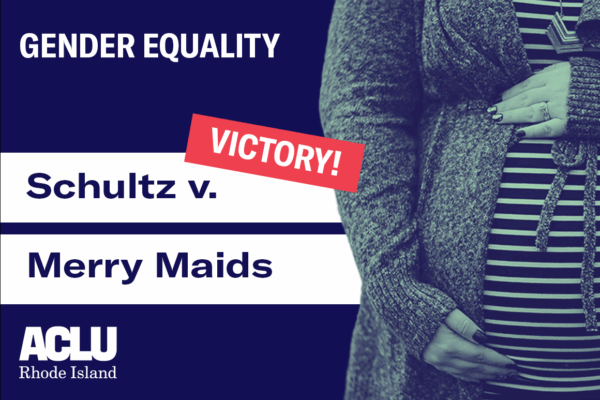By Nora Ellmann, ACLU of RI Intern
In 1978, the passage of the Pregnancy Discrimination Act (PDA) in the U.S. Congress was a monumental win for women’s rights movements. Before the law was passed, women could be fired, denied a job, or forced to stop working for being pregnant, and could be denied the same health and safety benefits given to workers with other medical conditions. My grandmother remembers wearing flowing and loose skirts to hide her pregnancy as long as she could so that she wouldn’t be forced to leave her job as a teacher. In 2015, stories like my grandma’s seem like part of an outdated past, yet 37 years after the PDA was passed, how much has really changed?
In 2006, Peggy Young, a UPS driver, was forced to stop working and lost her health benefits during her pregnancy because she could not lift more than 20 lbs. Instead of making reasonable accommodations for Ms. Young, UPS put her on unpaid leave with no medical coverage. The company did this even though, under UPS policy, this accommodation would have been made available to workers temporarily unable to perform their regular tasks because of on-the-job injuries, disabilities covered by the Americans with Disabilities Act, or loss of their commercial drivers’ licenses. After the Fourth Circuit ruled that UPS was not required under the PDA to provide Young the same accommodations afforded to other workers temporarily unable to perform their regular duties, she took her case to the U.S. Supreme Court.
This year, the U.S Supreme Court vacated that decision, and held Ms. Young can win in the lower court if she shows that she was denied accommodations given to others similar in their ability to work, and that her employer’s policies impose a significant and unjustified burden on pregnant workers. As our national office points out, she can do that by providing evidence that the employer accommodates “a large percentage of non-pregnant workers while failing to accommodate a large percentage of pregnant workers.”
For major corporations commit pregnancy discrimination in the 21st Century is almost unbelievable, yet it shows that workplace gender discrimination is alive and well. To take away a woman’s health benefits and source of income only because she is pregnant is not only unequal and discriminatory, but it is also dangerous. Many women cannot afford to stop working for the duration of their pregnancies, and need health benefits more than ever, especially as more and more women are the sole wage earners for their families.
In another positive step to prevent pregnancy discrimination in the workplace, the Rhode Island state legislature is considering legislation (H 5674, S 0276) supported by the ACLU of Rhode Island that would add additional safeguards to protect pregnant workers from unfair employment practices. These practices include firing, lack of accommodations and benefits, and refusing to hire a woman because she is pregnant. While this legislation is tremendously important, it also speaks to the disappointing state of gender discrimination in the workplace today. The fact that additional legislation and court cases such as Young’s remain necessary is extremely upsetting, and shows that pregnancy discrimination is certainly not a thing of the past.
For all of the cries that gender inequality is no longer a reality in this country, its continuing presence is perhaps nowhere clearer than in the workplace. Women still do not have equal pay for equal work, there are far fewer women in CEO positions, and a woman can still be discriminated against for her choice to have a child. Hopefully Rhode Island’s new legislation and the positive outcome of Young’s case will mark a step towards living up to the promise of gender equality and the Pregnancy Discrimination Act that was passed nearly 40 years ago.
Learn more about the ACLU of RI's work to protect Women's Rights and Workplace Rights.

